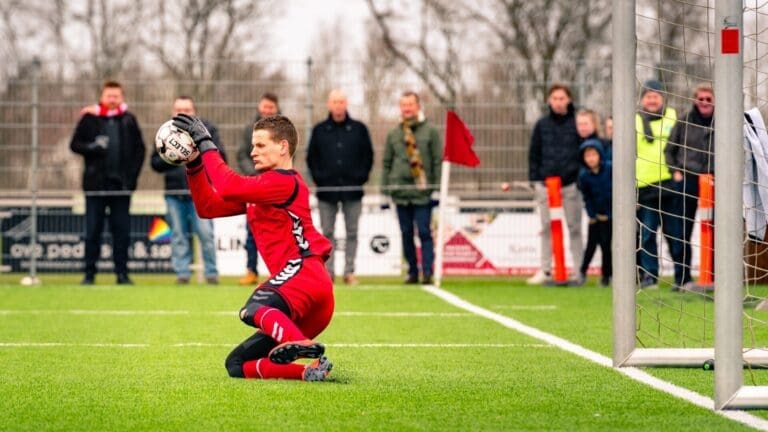
Goalkeeping Psychology Tips: How to Trust Your Skills When You’re a Goalkeeper
Are you an overthinker when playing in goal?
What is the meaning of trust when you’re a goalkeeper?
In general, according to Oxford Languages, trust is “a firm belief in the reliability, truth, or ability of someone or something.” So how does this translate to goalkeeping.
Trust is different to confidence in your ability. Confidence in your ability is to be able to see a cross coming in and then to take control decisively and execute or when you receive the ball with your feet to feel the weight of pass that you want to place to a team-mate and execute it.
Trust is being able to rely on what you do on the training ground so that you can operate on “autopilot” and execute your skills. What spectators, coaches, team-mates and the opposition will then see is a goalkeeper who is fully committed when taking crosses or decisive in the way you distribute the ball out from the back. They won’t see any hesitancy and you won’t get stuck in “overthinking” mode.
Let’s consider the difference between training and playing matches. From my experience across a range of sports it is noticeable how many players and athletes who fail to live up to their potential can get stuck in a “training” mindset. This is when they are thinking about the improvements that they can make to their game, so they get caught up “thinking too much”. Thinking about the work that they’re doing on the technical or tactical side of the game to get better.
Whereas the goalkeeper who performs close to their best in training on a regular basis and then repeats it in matches consistently is able to get into a “performance” mindset. These goalkeepers are better able to get the most from their talents and skillset. They don’t get caught up thinking about how they should be performing skills.
Tim Gallwey, the author of “The Inner Game of Tennis,” describes how many athletes can get in their own way when they over-coach themselves or are subject to over-coaching on the side lines with too many verbal instructions during matches – parents and coaches be warned! As a result, they end up performing in the “training” mindset.
These goalkeepers go on to get in their own way because their body has too many instructions to perform. If you think about the capacity of your short term memory. Most adults can store between 5 and 9 items in their short-term memory.
So how must a goalkeeper be feeling if he or she is given way too much information?
Overwhelmed, confused, uncertain, cautious, hesitant are some words some my clients have used.
Goalkeeping At Your Best
To get in the groove and find the zone, Gallwey says that you should look to to simplify your thinking when you perform. That you must have trust in your training, the things that you have learned and rely on motor memory.
If you think about a football or soccer match as a closed-book exam. You should look to test the skills that you have practiced in training during matches, you don’t continue “studying” in the match!
Goalkeepers who are perfectionists can find this especially difficult because they tend to:
- Get caught out thinking ahead of themselves, always wanting to keep on getting better instead of remaining present and focusing on what’s in front of them.
- Over-analyse mistakes and try to make changes at the wrong time.
- Think that their performances should look and feel perfect.
So how can you or your goalkeepers begin to trust themselves in matches?
- Understand that training and matches are different, understand what you think, look, feel and act like when you are in a “training” and “performance” mindset. Make a note of your tendencies now and then recognise when you need to turn off the training mindset and “just play”.
- Quit trying to be perfect in matches. Perform with a performance mindset. Accept that you may make some mistakes in a game, misplacing some goal kicks or you might come out of your penalty area when you should have stayed on your line. It’s ok, you are human not a robot, even the best DO make mistakes.
- Recognise that a warm up is a warm up, that’s all it is. A poor warm-up doesn’t mean that you will perform badly in a match.
- Gallwey says athletes need to shut off from “verbal instructions” they give themselves to allow their performance to shine. Consider as a goalkeeper, less thinking and more reacting, this is critical if you are to play to your potential.
- Take some lessons from mindfulness to help you remain in the present and less judgemental.
For further tips to make sure you improve your mental approach you may wish to access our goalkeeping specific video’s, podcasts and blogs
Including:
Podcasts
- How to Deal with Physical Insecurities as a Young Athlete
- From Professional Football and Goalkeeping to Physiotherapy
- Academy Football, Professional Football, Injuries and Early Retirement
Blogs
- Goalkeeper Mental Toughness Shouldn’t Be Left To Chance
- Goalkeepers – Does your warm up have to be perfect for you to feel confident
- Goalkeeping at Your Best Under Pressure
You may also wish to join David in The Sport Psychology Hub where our fantastic community share their experiences and insights to help you.

Best Wishes
David Charlton
Online Goalkeeping Psychologist who supports goalkeepers with their mental game all around the world from USA to Ireland and England to Australia, using ONLINE Video Conferencing.
Managing Director – Inspiring Sporting Excellence, Host of Demystifying Mental Toughness Podcast and Founder of The Sports Psychology Hub. With over a decades’ experience supporting athletes, coaches, parents and teams to achieve their goals, faster.
T: +44 7734 697769







